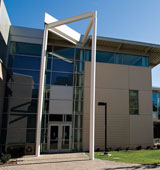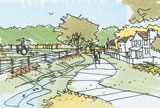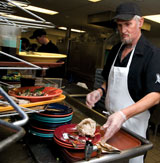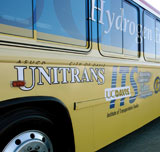Volume 25 · Number 4 · Summer 2008
Green Things at UC Davis

Green Buildings
The Tahoe Center for Environmental Sciences, which houses the UC Davis Tahoe Environmental Research Center at Incline, Nev., is one of a handful of science laboratories in the world to receive a Platinum LEED Certification from the U.S. Green Building Council. It uses 60 percent less energy and 65 percent less potable water than a building of the same function, climate and size designed to current code standards.
Gladys Valley Hall, a new veterinary medicine instructional building, was built to achieve Silver LEED certification. It is expected to use about one-third less energy than conventional buildings, as well as conserve water and provide better indoor air quality. Green features include natural ventilation, evaporative cooling, radiant floor slabs and greater use of natural lighting.
A new home for the Graduate School of Management — Maurice J. Gallagher Jr. Hall — and an adjoining conference center, under construction on the campus’ south entrance near the Mondavi Center and Interstate 80, is designed to achieve a Gold LEED Certification.

Sustainable Neighborhood
West Village, to be built in two phases on 224 acres of university land west of Highway 113, aims to combine affordable housing for about 4,350 people with the best environmental practices. Green features will include multiple bike and pedestrian paths, frequent Unitrans service, a retail center to reduce the need to drive to shops, and buildings designed and situated to conserve water and energy and optimize natural lighting and ventilation.
Zero Waste
The new Aggie Stadium is the first in the nation to adopt a zero-waste policy, selling only concession items that can be recycled or composted.
Food waste, paper napkins and other organic material discarded at the student dining commons are run through a pulping process and then composted. The project has been recognized as a best practice by a sustainability program for UC, California State University and California Community Colleges systems. UC Davis hopes to extend the program to the Silo and Coffee House.

The campus R4 Recycling program, on request, sifts through the trash coming out of a building or department, to determine how well the occupants are recycling.
Campus construction sites are now required to sort their metal, wood and plastic scrap for recycling.
Smart Lighting
At Webster and Emerson halls, suite-style residence halls in the Cuarto area, many of the bathrooms now feature “smart” vanity lighting that turns itself off after 30 minutes if students forget to flip the switch. The system, developed by UC Davis’ California Lighting Technology Center and vendor Metal Optics, also includes an LED night-light to help residents navigate safely without having to turn on the main light.
“Light harvesting” ballasts, which dim the electric lights according to how much natural light is present, have been installed in many lounge spaces, community spaces and some bathrooms in student residence halls.
Transportation

Unitrans, a partnership between ASUCD and the city of Davis, provides public transportation service to all of Davis, with more than 40 buses on 15 routes carrying more than 3 million passengers a year. Most of the buses run on clean-burning compressed natural gas and the remaining diesel buses are being converted or replaced.
As many as 20,000 people a day bike on campus, which along with the city of Davis has been named by the League of American Bicyclists as the most bicycle friendly community in the country.
Sustainable Purchasing
The campus encourages departments to follow the “5 Rs” of reduce, reuse, buy recycled, use available resources and recycle.
Food
The Coffee House offers locally produced and organic food options, including produce grown at the Student Farm and organic coffee and rice.
Sodexo, the campus’s food service vendor, offers an “environmentally friendly” menu option for university-catered events, with choices of locally grown produce, nuts and rice, organic and free-range meats and sustainable seafood.
— Kathleen Holder
